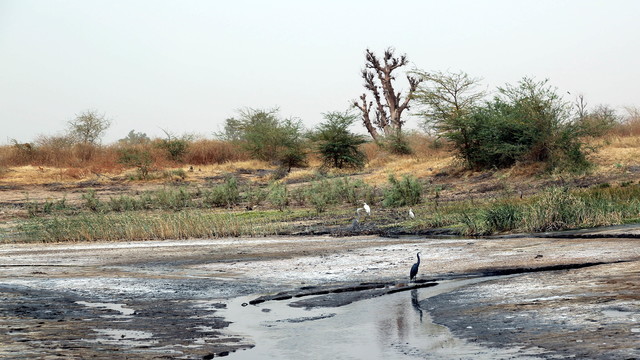EbA Evidence and Policy: Bangladesh
The EbA Evidence and Policy Project is gathering evidence on the effectiveness of ecosystem-based adaptation (EbA) approaches in the fishery sector in Bangladesh to mainstream EbA into national climate change and fishery policies.
Xiaoting Hou Jones was a senior researcher in the biodiversity team of IIED's Natural Resources research group until March 2024

Ecosystem-based adaptation (EbA) involves people using biodiversity and ecosystem services to adapt to the adverse effects of climate change and promote sustainable development. Between 2015 and 2019, IIED, the International Union for the Conservation of Nature (IUCN) and the UN Environment World Conservation Monitoring Centre (UNEP-WCMC) are jointly implementing a project called 'Ecosystem-based approaches to climate change adaptation: strengthening the evidence and informing policy' (EbA Evidence and Policy). Working with local partners in 12 countries, the project aims to gather practical evidence and develop country-specific policy guidance on EbA, and to promote EbA at international level. More information and all the case studies sites are available via the main project page.
What are we doing in Bangladesh?
IIED and Bangladesh Centre for Advanced Studies (BACS) are working to gather evidence on EbA effectiveness and gain policy insights from a project that aims to conserve Hilsa fish in Bangladesh.
IIED and BCAS used the EbA Evidence and Policy project’s Framework for Assessing EbA Effectiveness to consult with communities, NGOs, and national and local government staff on their perception of EbA effectiveness. The findings will be combined with those from the 11 other countries to help show climate change policymakers when and why EbA is effective.
The Hilsa fish, called ‘Ilish’ in Bengali, is of national importance to Bangladesh. It’s one of the country’s main staple foods. Implemented between 2013 and 2016, the IIED-led Hilsa conservation project worked with fishery communities and introduced a new reward system to incentivise conservation of Hilsa.
Though the project did not consider climate change in its inception and planning, the project delivered significant adaptation benefits by improving the management of fishery resources. For example, the project improved community resilience and adaptive capacity by introducing sustainable fishery practices and diversification of livelihood activities.
Results emerging from the study suggest that:
- Increased catches have strengthened local adaptive capacity, particularly among fishers, one of the poorest and most vulnerable groups in Bangladesh, but it is unclear whether the programme has been of overall financial benefit to this group.
- Barriers to implementing the programme have included insufficient capacity, technical skills, logistical support and financial resources at the local level, and inadequate policies and knowledge gaps at the national level.
- The sustainability of the programme, while dependent on continued government support and funding, seems likely, suggesting that the improvements in adaptive capacity could be long-term.
Informing policy
Based on lessons learnt, IIED and BCAS are actively engaging key government stakeholders to incorporate considerations of climate change impacts in the Incentive Based Hilsa Fishery Management Program of the Department of Fishery and mainstream EbA within climate change policies in Bangladesh.
Updates from BCAS
2017
In May 2017, IIED and BCAS organised a scenario planning workshop on adaptation of freshwater fisheries to climate change, with emphasis on ecosystem-based adaptation and biodiversity conservation. The workshop highlighted the important adaptation benefits that can be generated from sustainably managed fisheries ecosystems, including fish habitats and biodiversity, and instilled considerations for climate change impacts into fishery policies.
2016
In October 2016, BCAS and IIED organised an EbA workshop to brainstorm opportunities to mainstream EbA in climate change policies in Bangladesh. Representatives from Department of Environment (DoE), MoEF, BRAC, CNRS and the International Centre for Climate Change and Development (ICCCAD) attended the workshop.
Publications
Additional resources
Making ecosystems resilient through Bangladesh's Delta Plan, blog by Sheikh Moinul and Islam Moin, 2017
Ecosystem-based adaptation: question-based guidance for assessing effectiveness, Hannah Reid, Nathalie Seddon, Edmund Barrow, Charlotte Hicks, Xiaoting Hou- Jones, Ali Raza Rizvi, Dilys Roe, Sylvia Wicander (2017), IIED Toolkit
Partners
Bangladesh Centre for Advanced Studies (BCAS)
Bangladesh Agricultural University (BAU), Faculty of Fisheries, Mymensingh
Department of Fisheries, Ministry of Fisheries & Livestock, Government of Bangladesh (Collaboration)
Donors
International Climate Initiative (IKI).
The German Federal Ministry for the Environment, Nature Conservation and Nuclear Safety (BMU) supports the IKI on the basis of a decision adopted by the German Bundestag





